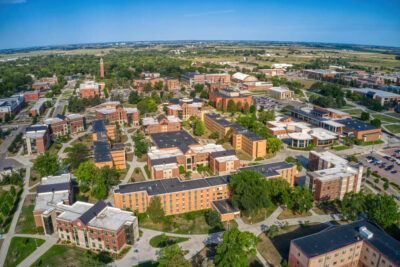4 trends in higher ed Facilities management—and how leaders should respond
At EAB’s recent Roundtable for Senior Facilities Officers, higher education Facilities management leaders gathered to share both strategic concerns and operational innovations—from optimizing campus space utilization to balancing higher ed Facilities budget challenges.
Here are four themes that stood out from the day’s conversations:
1. Financial pressures are driving a rethink of growth and revenue models
Institutions are feeling the squeeze—tight margins, shifting demographics, and enrollment volatility are prompting new financial strategies. While some institutions are focused on cost containment, others are exploring growth through acquisitions and brand expansion.
While the private for-profit sector has led enrollment growth over the past five years, more traditional institutions are investing in adult learners and veteran demographics that often require greater support. Other institutions continue to chart their own path by housing fully online students on campus, a hybrid approach that could point to future trends.
Key strategies for sustainable campus Facilities management:
- Develop financial models that reflect the unique service needs of adult learners and graduate students
- Use ROI frameworks on growth initiatives—whether new programs, capital projects, or acquisitions
- Reinvest tech transfer revenue back into the facilities that made it possible
- Push advancement teams to champion renovations and deferred maintenance alongside new builds
2. Space utilization in higher ed: Beyond “no net new”
Facilities leaders agreed: space is under pressure. From shrinking office footprints to gut-renovating historic apartments for faculty housing, institutions are experimenting with ways to optimize their footprint. Still, the idea of “no net new” in terms of building construction remains mostly theoretical—few attendees had formally introduced the policy, and even fewer had seen success.
Collaborative spaces for students and adjuncts were viewed more favorably than traditional offices, along with a growing need for storytelling tools (like infographics) to make the case for smarter space investments.
How to optimize campus space utilization:
- Deploy infographics to translate space data into compelling narratives for boards and cabinet leaders
- Pilot shared space models and central hubs—such as adjunct hubs and even off-campus acquisitions
- Create governance processes for space repurposing decisions that align with academic priorities and funding realities
- Update and adapt service level agreement models to clarify what Facilities covers—and what departments must own
3. AI in university Facilities management: Is your campus ready?
Many Facilities leaders are cautiously exploring AI pilots—but nearly all agreed their campuses aren’t quite “AI-ready.” While a handful of institutions are testing tools like occupancy sensors and energy platforms, many leaders emphasized the need to improve infrastructure before AI can be effectively scaled.
One Facilities leader called out the lack of trades-specific AI tools beyond energy and space management, while others shared concerns about fragmented data systems and aging buildings. Another institution shared a bit about their energy demand response strategy, including leasing generator capacity, showing how AI can intersect with broader infrastructure and revenue strategies.
Steps to prepare for AI-driven Facilities management:
- Form working groups with Facilities, IT, and planning teams to define “AI-ready” design standards for new builds and retrofits
- Prioritize energy efficiency in higher ed buildings with smart sensors and system interoperability
- Explore AI beyond energy: maintenance bots, service level agreement (SLA) compliance tools, and CMMS learning models (e.g., chatbots)
- Encourage peer learning through compendiums of AI use cases and shared vendor reviews
4. Interdepartmental collaboration: The untapped lever in campus operations
The roundtable reinforced what many leaders already feel: institutions want to learn from one another, but don’t always have the structure to do so. Some are already leading the way—on SLA, space planning, and AI pilots—and others are eager to replicate their success.
How to strengthen collaboration in higher ed Facilities management:
- Build informal peer cohorts around key topics like AI, SLAs, and donor-funded renovations
- Lightly document successful pilots to scale lessons internally and externally
- Host joint convenings with CIOs, CBOs, and Facilities to align priorities on infrastructure, energy use, and tech investments
- Borrow liberally: review sample SLAs, faculty space designs, and renovation models from top-performing peers
Navigating challenges in higher ed Facilities management
Our Roundtable for Senior Facilities Officers highlighted critical themes in higher education Facilities management, including the need for innovative financial strategies, effective space utilization, cautious exploration of AI technologies, and interdepartmental collaboration. By focusing on these areas, institutions can better navigate current challenges and create sustainable, innovative campus environments.
To aid in these efforts, we recommend utilizing resources such as our Space Productivity Metrics Toolkit and information on alternative revenue strategies that can enhance operational effectiveness. Contact your Strategic Leader or [email protected] to learn more.
More Blogs

Why are more higher education leaders interested in public-private partnerships?

Campus facilities operations are approaching a fundamental shift
